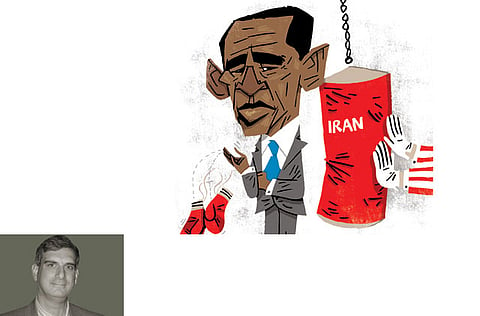Barack Obama is certainly not itching to start a war with Iran
It is surely an improvement that Obama says he will prefer not to fight

For many people, the rhetoric and political manoeuvring around Iran have a familiar feel. Whether in North America, Europe or the Gulf it is reasonably easy to turn on a TV set or open a newspaper and find a pundit warning that Washington is once again pushing the Middle East towards war.
US President Barack Obama spent most of last year insisting that just because his attitude towards Tehran was less belligerent than Mitt Romney’s, one should not assume that he is willing to see Iran acquire nuclear weapons. For many observers, however, the sight of repeated rounds of talks with the Iranians, even as rhetoric on both sides grows more heated, has an ominous feel to it.
It is difficult to look at all of this and not think of the months leading up to the start of the Iraq War. Yet, appearances can be deceiving. Make no mistake: The US is in a dangerous moment when a small miscalculation can trigger a war, but that does not mean that war is inevitable. Despite the superficial similarities, the spring of 2013 is not a replay of 2002-2003 — not as yet, at least.
For all of the ways this moment seems to mirror that of a decade ago, the fact remains that, to put it simply, Iran is not Iraq.
First, and most importantly, while Obama seems willing to go to war with Iran, if he feels he must, he appears far from eager to do so. When George W. Bush talked about finding a peaceful solution to America’s stand-off with Iraq, one that would not involve regime change or the use of force, it ought to have been clear to any rational observer that he did not mean it. Bush’s body language in front of the microphone, and his actions away from it, belied his true intentions.
The years since the invasion have removed any doubt about whether Bush’s decision to go to war was really left, as he claimed at the time, until the last minute. The July 2002 British cabinet document, known as the ‘Downing Street Memo’ speaks of a decision already having been made by the Bush administration as do the recollections of Richard Haass, who headed the State Department’s policy planning staff in the months leading up to the war. In his 2009 book War of Necessity, War of Choice, Haass recounts a meeting with the national security adviser, Condoleezza Rice, also in July 2002. “You can save your breath, Richard,” she told him. “The president has already made up his mind on Iraq.”
Is America in a similar moment, when a decision to fight has been made and all that remains is putting a battle plan in place while selling a new war to the public?
There are certainly some in Washington and elsewhere who would like to believe that to be the case, but can anyone look at Obama today and really believe that he is spoiling for a fight in the way Bush so obviously was?
Obama kept to the Iraq withdrawal timetable negotiated by the Bush administration in its final months and did not seem particularly bothered when talks on an agreement to leave a residual force in Iraq failed. He seems determined to keep his promise to bring US troops home from Afghanistan by the end of next year despite increasingly loud protests from America’s political right.
Add to this Libya, where the administration’s mantra was “leading from behind”, and what is clearly a firm policy of not getting sucked into Syria and it is hard to argue that the Obama administration is eagerly copying its predecessor, going abroad in search of monsters to destroy.
Even the clearest, and most controversial, military escalation of the Obama years — the ever-growing use of drones to kill America’s enemies from afar — is seen in America itself as a way of avoiding deeper involvement and inevitable escalation in far-off conflicts (a questionable assumption, but that is not today’s topic).
Put simply, the Obama administration may yet find itself in a shooting war with Iran or dragged into a war with Iran, started by the Israelis, but it is hard to look at the facts dispassionately and believe that it is itching to get such a war started.
Hardly a ringing endorsement, I grant. However, when compared to, say, January 2002, it is surely an improvement having someone in the White House who sounds sincere when he says he will prefer not to fight.
Gordon Robison, a longtime Middle East journalist and US political analyst, teaches political science at the University of Vermont.
Sign up for the Daily Briefing
Get the latest news and updates straight to your inbox



